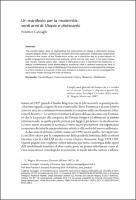Chapter Un manifesto per la modernità: venti anni di Utopia e disincanto
| dc.contributor.author | Carciaghi, Federico | |
| dc.date.accessioned | 2022-06-01T12:23:51Z | |
| dc.date.available | 2022-06-01T12:23:51Z | |
| dc.date.issued | 2021 | |
| dc.identifier | ONIX_20220601_9788855183383_609 | |
| dc.identifier.issn | 2420-8361 | |
| dc.identifier.uri | https://library.oapen.org/handle/20.500.12657/56424 | |
| dc.description.abstract | The current essay aims to highlighting the importance of Magris’ Utopia e disincanto. The year of its first publication (1999) was a watershed moment in his career, as it paved the way to a new season of public engagement and historical analysis, which can be also seen in his later essays and novels. Twenty years later, Utopia e disincanto is still a manifesto for modernity, a deeply contemporary book where Magris’ analytical view is headed towards an idea of universal literature, an idea of Weltliteratur that should be a tool to understand the changes in which mankind is involved. Literature is meant to be a tool to investigate the dark sides hidden among the folds of History | |
| dc.language | Italian | |
| dc.relation.ispartofseries | Biblioteca di Studi di Filologia Moderna | |
| dc.subject.other | Disenchantement | |
| dc.subject.other | History | |
| dc.subject.other | Modernity | |
| dc.subject.other | Weltliteratur | |
| dc.title | Chapter Un manifesto per la modernità: venti anni di Utopia e disincanto | |
| dc.type | chapter | |
| oapen.identifier.doi | 10.36253/978-88-5518-338-3.28 | |
| oapen.relation.isPublishedBy | bf65d21a-78e5-4ba2-983a-dbfa90962870 | |
| oapen.relation.isbn | 9788855183383 | |
| oapen.series.number | 59 | |
| oapen.pages | 11 | |
| oapen.place.publication | Florence |

